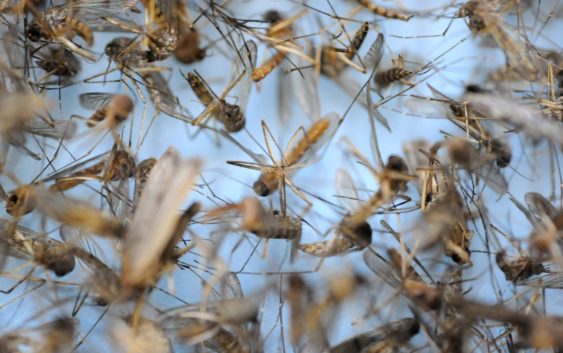- EF-1 tornadoes ripped through Cypress, Waller County areas with winds at more than 100 mph, NWS reports
- Houston-area storm damage updates: Clean up continues after NWS says two EF-1 tornadoes and powerful derecho ripped through SE Texas
- Low risk of damaging winds, hail from Saturday storms
- EF 1 tornadoes ripped through Cypress, Waller County areas at more than 100 mph, NWS reports
- Caddo Mounds State Historic Site to celebrate new visitor center, traditional grass house after 2019 tornado
Spraying fleets deployed to fight post-hurricane mosquitoes

Local counties are being proactive to fight a significant increase in mosquito populations after Hurricane Florence.
SOUTHEASTERN N.C. — Just as April showers bring May flowers, hurricanes bring mosquitoes — and lots of them.
Local communities are preparing for an onslaught of pesky, bloodsucking pests as stagnant floodwaters from Hurricane Florence breed increased populations.
The threat is great enough the state has already identified 27 counties to split $4 million in emergency mosquito control funding. New Hanover, Pender and Brunswick counties are among them.
Efforts to get ahead of the swarm were underway last week in New Hanover and Brunswick counties, where crews worked well into the night to get the first round of spraying done.
After the storm, Brunswick County encouraged residents to request spraying service if they see mosquitoes. Since then, it has received more than 9,000 requests, according to Jeff Brown, the county’s mosquito specialist.
“The major concern is that the number of mosquitoes is so high that it hampers reconstruction efforts,” he said.
Mosquitoes began to hatch on Sept. 23 and the county’s crews were out spraying the next day. They finished ground spraying the entire county Saturday and will transition to aerial coverage beginning Monday.
Once a spraying mission schedule is determined, a map will be provided to citizens showing when and where flights will happen each day so they can take appropriate avoidance measures.
David Howard, deputy director for New Hanover County Public Health, said vector control has almost completed a complete spray of all county zones as a proactive measure. the main concern right now is getting prepared for what is to come.
“It is a safe bet we will see a population boom, but where and how much we can’t say for sure,” he said.
After that is completed mid-week, they will continue to spray problem areas, including areas near the Northeast Cape Fear River, Burnt Mill Creek and anywhere else water has settled.
But it’s the spaces inbetween that will have to be given special attention.
“We have to remember some of the wooded areas between neighborhoods, where water will sit long enough to increase the mosquito populations,” he said. “Those are harder to get to for crews.”
The two weeks of consistent rain earlier this summer already caused a mosquito boom in the county and stretched Vector Control’s resources thin.
Howard said they are putting together a plan for more personnel and resources from various agencies and will apply for FEMA assistance, something Brunswick County has already done.
To keep up with demand, the department is also scaling back on the monitoring and cataloguing of mosquitoes captured in traps — save for what is required by law — to put all of their efforts into abatement.
As spraying continues, officials remind residents they can do their part as well.
“Citizens who want to help keep mosquitoes at bay can tip and toss,” Brown said. “Empty any containers that may hold standing water, and then set them over or at an angle so that they can’t fill with water again the next time it rains.”
This can mean anything like flower pots, spare tires or tarps that can collect water.
Citizens are also encouraged to head inside their homes for 30 minutes when they see spraying crews moving through their community.
Reporter Hunter Ingram can be reached at 910-343-2327 or Hunter.Ingram@StarNewsOnline.com.